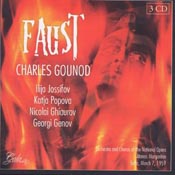After all, opera in nineteenth-century could be performed in translation and even with each principal singing in their own native languages. Such was the case when Gustav Mahler arrived in Budapest in 1888 and faced a performing tradition that allowed for multiple languages. Just as Mahler succeeded, to a degree, in arriving at a more consistent approach to opera by the time he left Budapest in 1891, so too do audiences almost expect such practices to be absent in the twentieth century, and certainly by 1959, when this recording was made.
The differences are not limited to the language, though, as the score was adapted to have the Valentin’s aria “Avant quitter” occur after the overture and just before the conventional first scene with Faust in his study in lieu of its place in the middle of that act (as Act 1, no. 6). This kind of revision is jolting, but not incomprehensible, and it establishes a certain tone by having ones of the opera’s more memorable pieces occur first.
While interest in this performance may focus on Ghiaurov, the other principals are strong and the ensemble as a whole is convincing. The intensity of the interpretation emerges, even when the opera is sung in translation and, further, in an unfamiliar language. The diction sounds clean, and more, the line as conceived in French, is not lost in the Bulgarian. Familiarity with Gounod’s Faust brings out, in a sense, an inner prompter to echo silently the lines of the French libretto even without having a text and translation to consult.
In some ways, it is reminiscent of Reiner’s recording of Prokofiev’s Alexander Nevsky with the Chicago Symphony Orchestra. The latter is sung in English, but the intensity of the performance may be seen to compensate for the use of a translation for the original text. Likewise, Atanas’s Faust works well, and those interested may want to listen to some of the more popular numbers, like Valentine’s aria or the “Veau d’or” scene of Mephistopheles or Marguerite’s “Jewel” aria. Those intrigued may wish to look further and enjoy the fine timing at the end of third act, where the interaction between Faust and Marguerite is memorable. If there is a weakness, it is, perhaps the chorus, which does not have the distinct sound that modern audiences have come to expect in opera performance. At the same time, the sound is forward on the stage, catching, as it were, the principals at the footlights, but not always reflecting equally well the sound of the full ensemble. Likewise, the source of the recording poses some challenges, which result in beating when Katjan Popova sounds as though she is singing directly into the microphone in full voice.
Such concerns are small quibbles, as it is possible to become accustomed to the sound and enjoy the fine, if not well-known performance. Given his later reputation, this recording is of interest for the role of Nicolai Ghiaurov in the role of Mephistopheles, and his performance is quite memorable. The rich sound of the Bulgarian bass is prominent in this recording, and those familiar with some of the singer’s other recordings will want to hear him in this live performance. In fact, the third CD includes excerpts from a performance of Verdi’s Attila (sung in Italian) with Ghiaurov in the title role (from a performance in Sofia), and those tracks are also of interest for hearing the bass in fine voice especially when heard in ensemble with Ezio (Nikola Vassilev), whose vocal style is less forward and projective than that of Ghiaurov. In this well-known role for Ghiaurov, the spontaneity of the live performance is of interest, and the sound quality is notable for a clear presentation of his voice.
The other bonus tracks on that CD (all undated, unfortunately) also feature some of the other principals heard in the recording of Faust, including the soprano Katja Popova (“Adieu, notre petite table” from Massenet’s Manon and “O mio bambino caro” from Puccini’s Gianni Schicchi), the baritone Georgi Genov with an extended aria from Rimsky-Korsakov’s The Tsar’s Bride (sung in Bulgarian), and the tenor Ilija Jossifov (“Che gelida manina” from Puccini’s La bohème and Lensky’s aria from the second act of Tchaikovsky’s Eugen Onegin). These are fine singers who are not known in the West, yet who were part of the music culture in which Ghiaurov developed as a performer. Such a perspective demonstrates the strong tradition in which the bass worked, and which for various reasons was essentially closed to the West. Again, the regional color of Bulgarian-language performances may set these recordings apart, but that does not seem entirely out of place, as opera is still performed in English translation at the English National Opera and elsewhere.
By no means the only Faust to own, this recording has much to offer. Those familiar with Ghiaurov’s voice should appreciate the live performance, which stands well besides some of Gala’s other releases in this genre.
James L. Zychowicz
